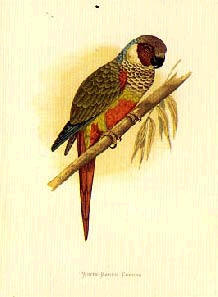Please Help Pets by Donating One Dollar
Fun loving birds, Conures are well known for their ability to chew on
practically anything. They also love to take baths.
Conures require a large amount of physical attention.
At least one hour or more of daily interaction.
Most Conures are very noisy and can be loud especially at dawn and dusk.
With practice, Conures can be taught to say a variety of words,
but generally are not good talkers.
Conures are good at learning tricks. Some species are good
cuddlers, others are not.
Facts about Pet Conures
Conures live from 20-30 years
They are from 10"-15" in length
Conures come from Central and South America. More than 100 species
and subspecies of Conures have been identified.
The most common color combinations are: green and red, blue and
green, gold, orange and green, and gold and green. Although
there is a wide range of other colors.
Some species of Conures fall asleep in their backs, often
on the cage floor or feed bowl.
Minimum cage size is 8"W x 22"L x 24"H.
Patagonian conures require a minimum cage size of 24"W x 36"L x 30"H
Keep cages away from drafts, open windows and the kitchen.
Conures are sensitive to smoke and strong odors. Cover the
cage at night to prevent drafts.
Have perches of different widths, diameters and textures
to help keep a Conure's feet healthy.
What to Feed Pet Conures
Feed a Conure 2-3 teaspoons per day of a pellet or seed-based,
fortified conure diet.
About 5-10% of a Conure's diet should be bite-sized fruits and
veggies like apples, oranges, bananas, grapes, sweet potatoes,
broccoli, spinach, dandelion, mustard greens and shredded
carrots. Offer daily or every 2-3 days.
Keep a cuttle bone or mineral block in the cage at all times.
Conures should always have access to clean, fresh water.
Don't use tap water. We recommend Steam Distilled water
for it's purity.
Signs a Pet Conure is Healthy
Clear, bright eyes
Clean, smooth feathers
Eats throughout the day
Normal droppings that are not runny for more than a couple of days
Signs a Pet Conure may be getting sick
Change in droppings in excess of two days
Decreased appetite; weight loss
Decreased activity and grooming behavior
Discharge from nose or mouth; sneezing
Feathers fluffed for prolonged periods of time
Sitting at the bottom of cage
Picture Conure

Magnificently Endearing Stuffed Plush Birds
Really Awesome Conure Calendars